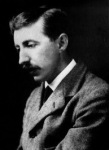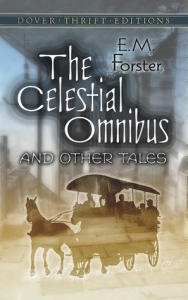After I read and enjoyed Forster’s collection of short stories I decided to try one of his longer works. I enjoyed this book so much that it will definitely be among my favorites.
My Review:
 Lucy is a naïve young English woman visiting Italy for the first time with her cousin Charlotte. Lucy quickly learns that not all people, and in fact not even all English people, are as reserved and mannered as she is. On their first night in Florence, Lucy and Charlotte are complaining that they paid for a room with a view, but the rooms that they were given did not, in fact, have a view. An elderly British gentlemen, Mr. Emerson, overhears the conversation and offers the women his room and his son George’s room. Mr. Emerson claims that men do not appreciate a view as much as women and he and his son are happy to change rooms to accommodate the women. Lucy, and especially her cousin Charlotte, are aghast at Mr. Emerson’s offer and they question the manners of a man who would be so forward and direct with them.
Lucy is a naïve young English woman visiting Italy for the first time with her cousin Charlotte. Lucy quickly learns that not all people, and in fact not even all English people, are as reserved and mannered as she is. On their first night in Florence, Lucy and Charlotte are complaining that they paid for a room with a view, but the rooms that they were given did not, in fact, have a view. An elderly British gentlemen, Mr. Emerson, overhears the conversation and offers the women his room and his son George’s room. Mr. Emerson claims that men do not appreciate a view as much as women and he and his son are happy to change rooms to accommodate the women. Lucy, and especially her cousin Charlotte, are aghast at Mr. Emerson’s offer and they question the manners of a man who would be so forward and direct with them.
One of the most pleasurable aspects of the story is Lucy’s growing and maturing as she learns to break free from her old-maid, stodgy cousin and her mother. Lucy eventually forms her own opinions about people and this includes Mr. Emerson and his son George. While others at the English pension ostracize the Emersons because of their outspoken manner, Lucy looks beyond the façade to see that they are kind, generous men who have been misjudged by their peers. Fate throws Lucy in the way of young George twice while they are in Florence; it is so disappointing when Charlotte hurries Lucy off to Rome in order to avoid any romantic entanglement between Lucy and George.
Forster is adept at skipping between different settings and timeframes. The story begins and ends in Florence with a stop in the English countryside in between. Part Two opens with Lucy back in England with her mother and her brother Freddy and she has accepted a third proposal from a Mr. Cecil Vyse. We learn that Cecil and Lucy met while in Rome and Cecil views Lucy as a lovely painting, much like a Leonardo he says, that he can view and admire. Cecil likes to read books and talk about art and he has every intention of molding Lucy into just the type of wife he needs for his aristocratic lifestyle. When George and his father move into the neighborhood, things become muddled for Lucy. Will she eventually see Cecil’s faults and choose the man who is so much more obviously suited to her?
There are a few things that not only drew me to this book but also caused me to put in on my “favorites” shelf. First, the descriptions of Florence, and the little town of Fiesole, are beautiful and accurate. Florence is my favorite place to visit in Italy and Fiesole is a gem of a spot from which to view the stunning landscapes of the countryside. Forster also inserts his sense of humor into the narrative, especially when he is poking fun at strict British rules of manners. The contrast between the stiff British and the carefree Italians is perfect. Finally, Forster provides us with just the right amount of tense in the plot to make this book a page turner.
If you want to read more classics but don’t want to commit to Dickens or Bronte or something quite so long, then give A ROOM WITH A VIEW a try first. The writing, the humor, the characters will all leave you wanting more Forster and more British classics.
He had five novels published in his lifetime, achieving his greatest success with A Passage to India (1924) which takes as its subject the relationship between East and West, seen through the lens of India in the later days of the British Raj.
Forster’s views as a secular humanist are at the heart of his work, which often depicts the pursuit of personal connections in spite of the restrictions of contemporary society. He is noted for his use of symbolism as a technique in his novels, and he has been criticised for his attachment to mysticism. His other works include Where Angels Fear to Tread (1905), The Longest Journey (1907), A Room with a View (1908) and Maurice (1971), his posthumously published novel which tells of the coming of age of an explicitly gay male character.




